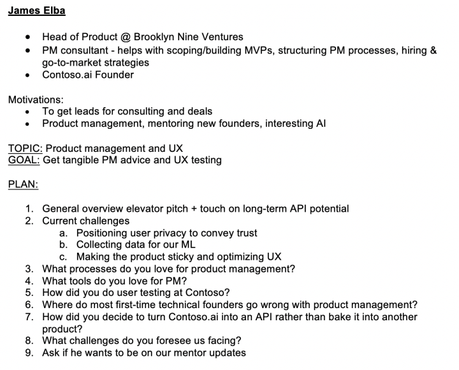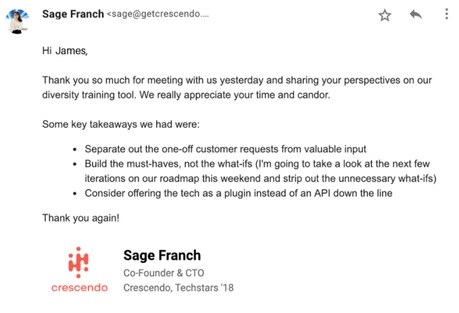As a startup founder, I meet hundreds of people each month. When my startup was going through Techstars, there was a period when we met 80 people in back-to-back 20-minute meetings over a span of 10 days. And as a mentor myself, too often I’ve seen people come to meetings unprepared and ask surface-level questions that don’t really get to the core of their challenges, and in those scenarios it can be hard to help effectively. Suffice to say, I’ve had a lot of practice meeting people and have honed in on a strategy for preparing for that first meeting with a potential mentor, and winning them over to start a long-term working relationship.
This is especially relevant to those of you who are new to the Techstars family – here’s how my team and I made the most of Mentor Madness.
. . . .
The mentor relationship builds in stages, especially for startups (though this guide can apply to anyone, not just startup folk). First you have to pique their interest and show them the value of what you’re doing. Only then can you ask them to mentor you more formally. That first step is what this template is for!
Before: Do Your Research
Going in to a meeting with someone, you should have a clear understanding of who the person is, what you want from them, and what you can offer them. The mentor-mentee relationship is a two-way street, so you should seek to build a genuine relationship with them, not just ask them for transactional help.
Prepare Your Notes
- Name & Title – who is this person and what do they currently do?
- Relevant past roles they’ve held, work they’ve done – what makes them relevant to your current challenges?
- Their motivations – why did they agree to meet you? This will vary a lot person to person and should guide the tone of your conversation.
- Topic/theme of your meeting – what overall theme do you want to cover?
- Main goal of your meeting – what do you want to get out of this?
- General flow, including any key points you want to convey to them. I usually start with which version of my elevator pitch I want to use, followed by my top 3-4 challenges that are relevant to them. This gives us a strong baseline to jump off and starts off the meeting strongly.
Here is a sample, adapted from a real template I used in a meeting with a mentor (names changed). Downloadable copy here.

Notice in the plan above, I have included a series of questions to ask. During the meeting you might not end up going through everything – sometimes your expectations about what someone wants to discuss are different from the reality of where the conversation will go, and that’s okay.
During: Stick to the Plan
Let it flow, but use your template to bring it back on track. The beauty of the template is you already have a clear picture of where you want the conversation to go, so no time is wasted on searching for common ground. When asking for mentorship, you’re already in a position of benefitting from someone else’s time and energy, and coming prepared shows that you respect their time and see the value of what they’re giving.
On the topic of being mindful of time, if you think you’ll have a hard time keeping track of the time during the meeting, set a silent alarm for 2 minutes before the end of the meeting. If you still have more to talk about when the alarm sounds, ask if they have a hard stop or can stay a few minutes over. You should never go over the end time without first confirming they don’t have a hard stop (and giving them the choice to cut it at the scheduled end time).
I remember when I secured a 15-minute call with one of the Co-CEOs of Techstars. I was warned by the people who set up the meeting that he had very little time but could spare 15 minutes to help me out. Putting the effort in to filling in this template allowed us to stay on track and have a fruitful discussion in that short time, and he was able to unblock some of the big questions I was facing at the time.
The last question I usually ask on a meeting is related to what comes next: would they like to be on the update list? Are they available next week for a follow-up call to go deeper into the ideas we discussed? Would it be alright if I reach back out when I hit milestone X to update them and get their thoughts on the next steps? These questions open the doors for a longer-term relationship, and set expectations of the timeline and level of involvement you’re looking for.
After: Follow Up with Takeaways & Next Steps
Follow up! A quick note will do, something to express your gratitude and document any next steps you discussed. I usually include 3 top takeaways from our meeting, to remind both of us what we talked about if we look back at the email in the future.
The example below is a real email I sent to a mentor after one of our Mentor Madness meetings:

Final Thoughts
Finding the right mentor can make all the difference when you’re in a period of growth. This framework provides you with a strong starting point from which to nurture these relationships. It establishes a high-value relationship with a baseline of respect, and opens the door to future conversation. As I said before, the mentor-mentee relationship is a two-way street, and putting the effort in to that first meeting goes a long way to establish value and winning over a potential mentor.
Any questions? Leave me a comment here or on Instagram!
. . . . . . .

